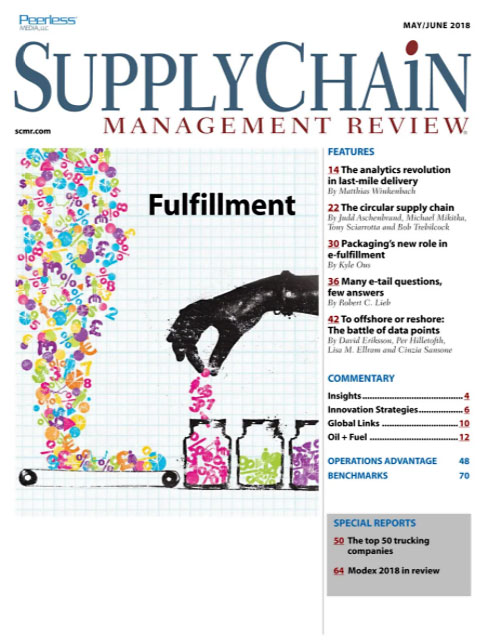Sorry, but your login has failed. Please recheck your login information and resubmit. If your subscription has expired, renew here.
May-June 2018
Last month, I was in Atlanta at the Modex trade show. In one sense, it is a tribute to the automation technologies managing today’s distribution networks. And, I’m not only talking about automated materials handling systems, but also the software and NextGen technologies such as robotics, wearable technologies, including smart glasses and augmented reality solutions and sensors enabling the Internet of Things. In another sense, all of these solutions are coming together to drive fulfillment. With the increase in e-commerce, getting the right product to the right customer at the right time has never been more important. Browse this issue archive.Need Help? Contact customer service 847-559-7581 More options
Two reports from prominent global think tanks bring into question some past “best practices” of supply chain management, which may soon be regarded as not only antiquated, but wasteful as well.
Researchers from the Ellen MacArthur Foundation maintain that the linear “take, make, dispose” model—the dominant economic template of our time—relies on large quantities of easily accessible resources and energy, and therefore is increasingly unfit for today’s complex global trade networks.
Unfortunately, researchers add, working toward efficiency by reducing the resources and fossil energy consumed per unit of economic output will not alter the finite nature of their stocks—but can only “delay the inevitable.”
They conclude that a more fundamental change of the operating system is necessary because the concept of the circular economy has been gaining traction for a variety of obvious reasons. According to the Ellen MacArthur Foundation, the circular economy is characterized (more than defined) as “an economy that is restorative and regenerative by design and which aims to keep products, components and materials at their highest utility and value at all times.”

This complete article is available to subscribers only.
Log in now for full access or start your PLUS+ subscription for instant access.
SC
MR
Sorry, but your login has failed. Please recheck your login information and resubmit. If your subscription has expired, renew here.
May-June 2018
Last month, I was in Atlanta at the Modex trade show. In one sense, it is a tribute to the automation technologies managing today’s distribution networks. And, I’m not only talking about automated materials… Browse this issue archive. Access your online digital edition. Download a PDF file of the May-June 2018 issue.Two reports from prominent global think tanks bring into question some past “best practices” of supply chain management, which may soon be regarded as not only antiquated, but wasteful as well.
Researchers from the Ellen MacArthur Foundation maintain that the linear “take, make, dispose” model—the dominant economic template of our time—relies on large quantities of easily accessible resources and energy, and therefore is increasingly unfit for today's complex global trade networks.
Unfortunately, researchers add, working toward efficiency by reducing the resources and fossil energy consumed per unit of economic output will not alter the finite nature of their stocks—but can only “delay the inevitable.”
They conclude that a more fundamental change of the operating system is necessary because the concept of the circular economy has been gaining traction for a variety of obvious reasons. According to the Ellen MacArthur Foundation, the circular economy is characterized (more than defined) as “an economy that is restorative and regenerative by design and which aims to keep products, components and materials at their highest utility and value at all times.”
SC
MR


Latest Supply Chain News
- Services sector sees growth in October, reports ISM
- Balanced supply chain management Part 4: The key—leading beyond the silo
- Managing inbound freight: What has changed in two decades?
- Inbound freight: Often a missed opportunity
- Aggregators sitting on the throne of Africa’s e-commerce supply chains: What lessons can we learn?
- More News
Latest Resources

 Explore
Explore
Procurement & Sourcing News
- Aggregators sitting on the throne of Africa’s e-commerce supply chains: What lessons can we learn?
- Cross-border transport 2024: Navigating the surge
- Benchmarking the complexity of ESG reporting
- Looking back at NextGen 2024
- The Corporate Sustainability Due Diligence Directive
- How to make your CFO a supply chain superfan
- More Procurement & Sourcing
Latest Procurement & Sourcing Resources

Subscribe

Supply Chain Management Review delivers the best industry content.

Editors’ Picks






